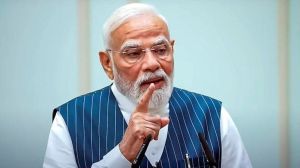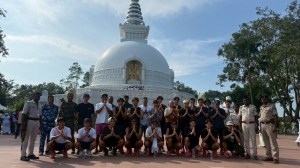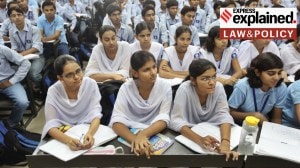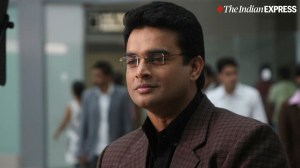On New Year’s, PM plays the dove, VHP says we don’t care
NEW DELHI, JANUARY 1: Less than a fortnight after he justified his description of the Ram Temple at Ayodhya as ``(an unfulfilled) expressi...

NEW DELHI, JANUARY 1: Less than a fortnight after he justified his description of the Ram Temple at Ayodhya as “(an unfulfilled) expression of national sentiment,” Prime Minister Atal Behari Vajpayee began the year today on a more moderate note calling the demolition of the Babri Masjid a flagrant violation of the law. And without naming the VHP, he warned agaist disturbing the existing situation.
The need for Vajpayee to make this clarification seems to have come from increasingly restive allies on the one hand and pressure from the Sangh on the other. Especially when the VHP, emboldened by the PM’s earlier remarks, said that it would announce the date for temple construction at the Dharma Sansad in Allahabad on January 19 and 20.
“I wish to make it absolutely clear that the law will take its own course should any organisation attempt to disturb the status quo,” Vajpayee said in his first of a two-part article, My musings from Kumarakom scheduled to appear in some newspapers tomorrow.
The VHP, however, claimed that the PM wasn’t saying anything new. “The status quo exists,” said VHP spokesman Manohar Puri, “Our plan of temple construction is on as per the schedule which will be finalised by the sadhus. We will abide by the directives of only the dharmacharyas and not the Prime Minister or the court.”
Vajpayee, however, struck a different note. “The wrongs of the medieval past cannot be righted by similar wrongs in modern times,” Vajpayee said, vowing to maintain the status quo at Kashi, Mathura and other disputed places of worship.
The Prime Minister denied having said that the temple should be built at the disputed site without either a judicial verdict or an amicable agreement between the two communities. He also claims that his reference to the Ram Temple as an expression of national sentiment was only in the past tense:
“Although the movement for construction of the temple was an expression of a national sentiment, this sentiment became narrow and, its inclusive character became retrictive because of the unfortunate demoliton of the disputed mosque structure on December 6, 1992,” he has written. The only dispute at Ayodhya was where and how the temple could be constructed and on this contentious matter “my views have been clear and consistent”.
Vajpayee said it was a challenge to the collective wisdom of society to work out a peaceful and amicable solution, reiterating that there were only two ways to resolve the issue: either the judicial route or negotiations.
The government was bound to implement the judiciary’s verdict whatever it may be but this did not foreclose the need for negotiations in a non-governmental and non-political framework, he has said. The Judicial route and the option of talks are complementary, he said stressing the need for early resumption of dialogue as the issue could not be allowed to hang on for ever.
Vajpayee claimed the media had, “for no reason, twisted and turned,” the issue. “Overnight I was transformed class from a moderate to a hard-liner. "Vajpayee unmasked" they said conveniently masking the fact that my public life is an open book. “Worse still, a campaign was launched to create misgivings about me in the minds of the minority”.
Taking a dig at the Congress which initiated the Parliament debate on his recent statements, Vajpayee said the Ram Temple movement struck a supportive chord in more than one political party. “Had it not been so, Rajiv Gandhi would not have taken the kind of specific steps to facilitate the temple construction. This showed that there was no dispute over the Ram temple being an expression of national sentiment”, he said.
Rajiv even inaugurated the Congress party’s 1989 election campaign from the vicinity of Ayodhya with a promise to usher in Ram Rajya, which was also Mahatma Gandhi’s dream. “There was nothing communal about either Gandhiji’s vision or Rajiv Gandhi’s initiatives at Ayodhya”, Vajpayee said taking the wind out of Congress’s campaign.
Vajpayee says his hope about his Parliament reply putting an end to the entire controversy was dashed by political parties. “I must confess that I am pained by some of the comments, observations and speculation in the aftermath of the recent developments in parliament. My political adversaries are entitled to disagree with me, but they will not be able to see any inconsistency in my views on the Ayodhya issue, all of which are well recorded,” the Prime Minister said.
Photos


- 01
- 02
- 03
- 04
- 05




























